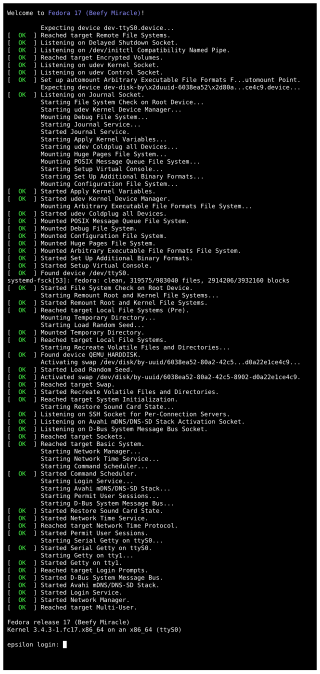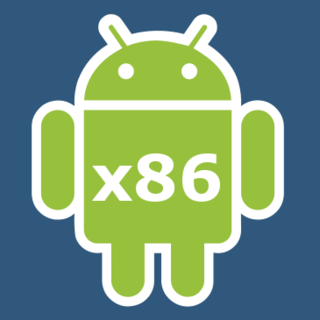| Developer(s) | David Zeuthen |
|---|---|
| Initial release | 2008 |
| Stable release | 003 / March 2, 2009 [1] |
| Operating system | Linux |
| Type | HAL |
| License | GPL [2] |
| Website | freedesktop.org/wiki/Software/DeviceKit |
DeviceKit is a modular hardware abstraction layer designed for use in Linux systems that is designed to simplify device management and replace the current monolithic Linux HAL. DeviceKit includes the ability to enumerate system devices and send notifications when hardware is added or removed from the computer system.
In May 2008, HAL developer David Zeuthen announced his intention to deprecate HAL, mainly because of its complexity and redundancy with other libraries in the Linux environment. [3] The only missing part in those libraries would be a centralized service to enumerate existing devices, signal adding/removal of devices and merging and classifying available hardware information in one point. DeviceKit is the new library providing those services, while the hardware is supposed to be accessed through other libraries instead of HAL or DeviceKit.
The first distribution to include DeviceKit was Fedora 11. [4] Ubuntu 9.10 replaced some of the old HAL features with DeviceKit and functionality from udev. [5]
On 1 December 2009, it was announced that DeviceKit-disks was renamed to udisks and that a similar rename would happen for DeviceKit-power. [6]
According to DeviceKit devel mailing list, DeviceKit is getting merged with udev-extra and the existing DeviceKit programs such as DeviceKit-disks and DeviceKit-power will be switched over to use libudev. [6] [7]

A Linux distribution is an operating system made from a software collection that includes the Linux kernel and often a package management system. Linux users usually obtain their operating system by downloading one of the Linux distributions, which are available for a wide variety of systems ranging from embedded devices and personal computers to powerful supercomputers.
udev is a device manager for the Linux kernel. As the successor of devfsd and hotplug, udev primarily manages device nodes in the /dev directory. At the same time, udev also handles all user space events raised when hardware devices are added into the system or removed from it, including firmware loading as required by certain devices.

A free and open-source graphics device driver is a software stack which controls computer-graphics hardware and supports graphics-rendering application programming interfaces (APIs) and is released under a free and open-source software license. Graphics device drivers are written for specific hardware to work within a specific operating system kernel and to support a range of APIs used by applications to access the graphics hardware. They may also control output to the display if the display driver is part of the graphics hardware. Most free and open-source graphics device drivers are developed by the Mesa project. The driver is made up of a compiler, a rendering API, and software which manages access to the graphics hardware.
In Linux systems, initrd is a scheme for loading a temporary root file system into memory, to be used as part of the Linux startup process. initrd and initramfs refer to two different methods of achieving this. Both are commonly used to make preparations before the real root file system can be mounted.

PulseAudio is a network-capable sound server program distributed via the freedesktop.org project. It runs mainly on Linux, including Windows Subsystem for Linux on Microsoft Windows and Termux on Android; various BSD distributions such as FreeBSD, OpenBSD, and macOS; as well as Illumos distributions and the Solaris operating system. It serves as a middleware in between applications and hardware and handles raw PCM audio streams.

Sugar is a free and open-source desktop environment designed for interactive learning by children. It was developed by SugarLabs. Developed as part of the One Laptop per Child (OLPC) project, Sugar was the default interface on OLPC XO-1 laptop computers. The OLPC XO-1.5 and later provided the option of either the Gnome or Sugar interfaces.
HAL is a software subsystem for UNIX-like operating systems providing hardware abstraction.
Upstart is a discontinued event-based replacement for the traditional init daemon—the method by which several Unix-like computer operating systems perform tasks when the computer is started. It was written by Scott James Remnant, a former employee of Canonical Ltd. In 2014, Upstart was placed in maintenance mode, and other init daemons, such as systemd, were recommended in place of Upstart. Ubuntu moved away from Upstart with the release of version 15.04 in favor of migrating to systemd. As of March 2023, there have been no updates released for Upstart since September 2014.
OtherOS is a feature of early versions of the PlayStation 3 video game console, allowing user installed software, such as Linux or FreeBSD. The feature was removed since system firmware update 3.21, released on April 1, 2010.

Polkit is a component for controlling system-wide privileges in Unix-like operating systems. It provides an organized way for non-privileged processes to communicate with privileged ones. Polkit allows a level of control of centralized system policy. It is developed and maintained by David Zeuthen from Red Hat and hosted by the freedesktop.org project. It is published as free software under the terms of version 2 of the GNU Lesser General Public License.

Moblin, short for 'mobile Linux', is a discontinued open source operating system and application stack for Mobile Internet Devices (MIDs), netbooks, nettops and embedded devices.

GNOME Disks is a graphical front-end for udisks. It can be used for partition management, S.M.A.R.T. monitoring, benchmarking, and software RAID. An introduction is included in the GNOME Documentation Project.

systemd is a software suite that provides an array of system components for Linux operating systems. The main aim is to unify service configuration and behavior across Linux distributions. Its primary component is a "system and service manager" – an init system used to bootstrap user space and manage user processes. It also provides replacements for various daemons and utilities, including device management, login management, network connection management, and event logging. The name systemd adheres to the Unix convention of naming daemons by appending the letter d. It also plays on the term "System D", which refers to a person's ability to adapt quickly and improvise to solve problems.
Consistent Network Device Naming is a convention for naming Ethernet adapters in Linux.
Fedora Linux is a popular Linux distribution developed by the Fedora Project. Fedora attempts to maintain a six-month release schedule, offering new versions in May and November, although some releases have experienced minor delays.

Android-x86 was an open source project that made an unofficial porting of the Android mobile operating system developed by the Open Handset Alliance to run on devices powered by x86 processors, rather than RISC-based ARM chips.

Dracut is a set of tools that provide enhanced functionality for automating the Linux boot process. The tool named dracut is used to create a Linux boot image (initramfs) by copying tools and files from an installed system and combining it with the Dracut framework, which is usually found in /usr/lib/dracut/modules.d.

UPower is a piece of middleware for power management on Linux systems. It enumerates power sources, maintains statistics and history data on them and notifies about status changes. It consists of a daemon (upowerd), an application programming interface and a set of command line tools. The daemon provides its functionality to applications over the system bus. PolicyKit restricts access to the UPower functionality for initiating hibernate mode or shutting down the operating system (freedesktop.upower.policy). The command-line client program upower can be used to query and monitor information about the power supply devices in the system. Graphical user interfaces to the functionality of UPower include the GNOME Power Manager and the Xfce Power Manager.

The Librem 5 is a smartphone manufactured by Purism that is part of their Librem line of products. The phone is designed with the goal of using free software whenever possible, includes PureOS, a Linux operating system, by default, and as of 2021 is the only smartphone recommended by the Free Software Foundation. Like other Librem products, the Librem 5 focuses on privacy and freedom, and includes features like hardware kill switches, and easily-replaceable components. Its name, with a numerical "5", refers to its screen size, and not a release version. After an announcement on 24 August 2017, the distribution of developer kits and limited pre-release models occurred throughout 2019 and most of 2020. The first mass-production version of the Librem 5 was shipped on 18 November 2020.
The Linux kernel can run on a variety of devices made by Apple, including devices where the unlocking of the bootloader is not possible with an official procedure, such as iPhones and iPads.